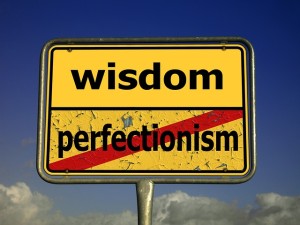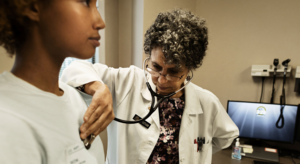
I was sure that we had cut the ureter. Every time we looked and found it intact, I became even more certain that we had cut it. Finally, my exasperated chief resident told me to stop. I was emergently operating on my next door neighbor for what turned out to be cancer, and that’s how I excused my paranoia. (She’s now cancer free, and yes, her ureter is fine). That kind of worrying had taken over my practice of surgery, though. The joy of operating, teaching residents, watching patients heal and recover from major and minor illness had been replaced by a constant vigilance for the next complication, unexpected finding, or patient that I was unable to help. Every decision, every operation, whether straightforward or difficult had become agonizing. I was consumed with trying to make sure everything was perfect. I stopped believing in chance, uncertainty, and incurable disease. Unfortunately, that was all in my subconscious. Consciously, I felt like I was being diligent and holding myself accountable in an admittedly high stress career. After all, I was responsible for people’s lives, right? Though I didn’t see it at the time, I had lost focus on my patients because I was completely focused on making sure I didn’t make a mistake. At the same time, I was winning teaching awards from residents and medical students. I had the trust of colleagues who asked me to operate on their loved ones. By all accounts, I was a well-respected and competent surgeon, yet I was having chest pain on my drive in to take out an appendix. I desperately wanted the pain to stop, so I started looking for ways to quit surgery.
It had started during my third year pediatric surgery rotation. A 3-year-old girl died following a simple procedure, and I felt the soul-crushing reality that even the small things we do have major consequences. From there it was double thinking every decision, replaying each operation in my mind sometimes dozens of times, lying sleepless, staring at my pager and dreading the next call.
When I reached the point where I was having chest pain and suicidal ideation, I got into counseling. At the first session, I spilled all of my angst. The counselor looked at me and said “You’re an asshole.” That was a bit less support than I was expecting, but he continued. “Look at how you’re treating yourself, is this how you treat your patients? Your family? Why have you put up with this abuse for so long?” He also pointed out (to my horror) that I had a God complex – I had convinced myself that if I did my job perfectly, I would get perfect results. I had thought I was rooted in reality, but I really wasn’t.
Opening myself up to counseling (which required swallowing a lot of pride) honestly may have saved my life. Like any other recovery, the first step was realizing that I needed help. The next step (and the hardest for me) was asking for help. I had to trust someone else the way my patients trusted me. I had to be open to things I didn’t really believe in at the time. I had to accept that things could get better, but that there was no quick fix to my pain, like finding a new job or career. At first, it was simple relaxation techniques. I’ve since learned about the power of mindfulness, meditation, and practicing gratitude. I’ve found a peaceful bliss in yoga. Yeah, picture your favorite (or least favorite) surgeon quietly meditating or posed in a downward facing dog. Trust me, it’s funny. I’ve gradually learned to quiet the storm that had taken over my consciousness. It was hard work. Harder than anything I’ve ever done. No joke.
The next thing I needed to do was to take an honest look at what was going on in my head. What I found was that I had lost track of reality. I was spending so much time ruminating in my head that I had become unaware and not accepting of what was really going on in the world. I was caught up thinking about how things should be rather than accepting how things actually are. I was addicted to perfection and would accept nothing less. Accepting reality meant accepting imperfection – my own, and that of the world around me. I had to realize that I have a lot less control over reality than I want. What I do have control of, though, is how I react to and interact with reality. I’ve learned that striving for perfection is different than expecting perfection. Perfection is not an outcome measure. Reality is the outcome. Perfection is doing the best I can with the situation presented to me, accepting the reality of the outcome, and realistically assessing if I can do better the next time.
It’s been a long road, but I’m better now. I’m eight years into practice, and I like being a surgeon. I can schedule a major case without chest pain. I can deal with a major complication without falling into depression. I can separate myself from the pain and suffering I see every day so that I can be fully present with my family. Despite that separation, I feel even more compassion and have more satisfying relationships with my patients and colleagues. The energy I was putting into angst can now go to my family and to myself without the guilty feeling that maybe I’m not doing enough for my patients. I think my complication rate has actually gone down, too.
Am I cured? No. I’m in recovery, just like any other addict. And just like any other addiction, it has gotten easier with time, but I know it will never go away. I slip. I pick myself up. I ask for help. The trick is to have the awareness to realize when I am slipping. I’ve moved from counseling to career coaching, but this is still the foundation I have to keep coming back to as I work to shape my career. I strive for the strength to change what I can, the serenity to accept what I cannot, and the wisdom to know the difference. The world is not perfect. It never will be. And that’s okay. I’m not here to make it perfect, I’m here to make it better.
A big “Thank you!” to one of my great clients for sharing his story. I talk with many doctors who think they may have to leave medicine. In many cases, this is not true. If you are questioning your career choice, it is worth the time and effort to find out what is possible for you. There is a right answer for you, and it can be found.
Latest Posts
Find what you're looking for:
Popular Categories:
Career Change | Career Enhancement | Job Search | Personal Development
12 Comments
Leave a Comment























Thank you so much for this article. I related to it so much, and am encouraged to know that there’s a way through the anxiety!
Geetika, you are most welcome. I am grateful to my client who shared his story so other doctors can know there is a constructive way out of perfectionism. Many doctors suffer from this problem because the same traits and high standards that make them excellent physicians also cause them to place unrealistic expectations on themselves. It takes true discernment and self-compassion to find the right balance. I am glad that this blog was helpful to you! Thank you for reading and commenting.
Thanks for sharing this story. Could be titled “On being a human first, a surgeon second”.
Good luck on your journey, and please keep sharing it. As a surgeon and a patient, I can tell you, patients respond better emotionally and physically (yes they get better outcomes!) when their surgeon is down-to-earth, self-effacing, self-aware, and honest about their personal involvement with the patient’s emotional and physical needs. This doesn’t mean being a compulsive hand-holder and hugger, etc., it just means being yourself without the white coat armor that we often use to distance, protect, and effectively dehumanize ourselves.
Namaste
On behalf of the author, I thank you very much Bryan, for your astute comments. You offer excellent advice. Thank you for sharing your perspective and support! All the best to you too on your journey.
Thank you to you and your client for sharing such a deeply personal story. I hope more physicians will be encouraged to share their stories about perfectionism and lack of self-compassion. Everyone should live free from the fear of imperfection.
I am passionate about physician health and work in this area so I really appreciate seeing such authentic messages from other physicians. It can truly make a difference in the lives of physicians and their families.
All the best,
Sara
Sara, I appreciate the work that you are doing in helping other physicians in the area of well-being. Thank you for reading and offering this most supportive and encouraging feedback. Good luck with your efforts on behalf of physicians. We need you!
Excellent sharing of your dealing with those clandestine delusions we all,to some degree,
carry with total wastefulness. I am a semi retired surgeon who is dealing with my own brand of artificial thoughts that can impede moving forward. After a brief consultation with Heather I feel a new strength of
hope of ability to return to medical work force in a new capacity.
Thanks for your letter with words of a wavelength that resonates with me.
Thank you Steve for your great comments and kind words. I am really glad this post resonated with you, and you are feeling hopeful about the future. It’s wonderful to hear from you.
Absolutely, we all have these types of experiences and feelings. I applaud this surgeon’s strength to seek help and continue in the profession. I too, have found myself compulsively checking and rechecking that I made no mistakes. I also wanted to quit medicine. I am now working part time and really enjoying medicine, I was so overworked in part time solo medical practice that I began to hate the profession and its demands.
Martha, I appreciate your sharing your experience as well as reading and commenting on this blog. It is so helpful for other physicians to see that they are not the only ones struggling and to hear success stories like yours where you found the right balance for yourself. Good for you for figuring it out and finding a way to still enjoy medicine and have a life.
Thank you to the author for sharing. I too have perfectionism & am trying to dig myself out of what has become an awful situation, trying to meet everyone’s expectations perfectly, knowing it’s impossible, and getting one stress induced ailment after another. I just made the decision to leave where I am, hopefully not quit medicine but do it more sanely,with less fear, and more sleep and family time. I’m giving myself a year to do it. I’ve been reading this site for 6-12 months and appreciate the posts on doing things differently.
Hello CB, It’s great to have your comment. Thank you for reading and sharing your own situation. Good for you for making a decision to find something better for yourself. No one should have his or her health suffer in the process of providing healthcare! Many of the doctors I work with find better clinical settings and are able to enjoy practicing medicine again. I am glad you are going to make your own satisfaction and health a priority. Please keep in touch and let us know how things go for you.